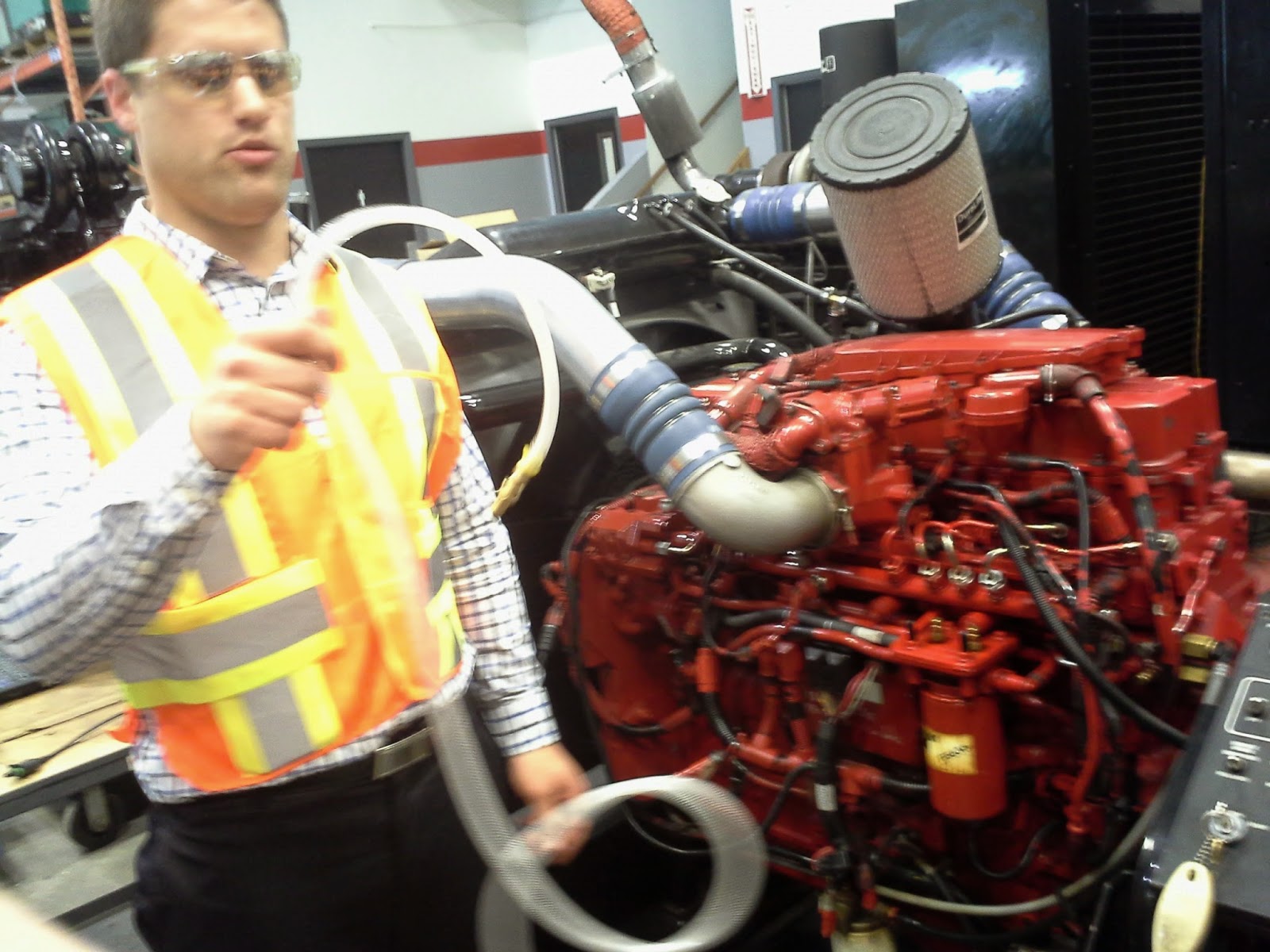Mechanical Repairs & Troubleshooting On Diesel Engines, School Buses and Related Operating Systems.
Showing posts with label cummins diesel repair. Show all posts
Showing posts with label cummins diesel repair. Show all posts
Friday, December 05, 2014
Cummins Diesel Engine Training
Training is everything especially if you own the newest diesel engines in the market. I recently went down to Vancouver (BC) to get some training at the Cummins training centre and it was well worth it. The ISB 6.7 liter diesel engine is by far (in my opinion) the best medium duty engine available.
They have designed their own emission system including selective catalytic reduction and DPF (diesel particulate filter). Getting the emission levels down to EPA levels is a huge challenge. Cummins is reducing 90% of harmful exhaust out of the pipe. We own 9 of the ISBs and getting 10 more next year.
The support from our local dealer is very good which was one of the factors we looked at but I know even if the support wasn't there this would have been the engine of choice regardless. Having 'Insite Lite' software is a "must have" and without it you're sunk. Throwing parts at a problem and guessing what's wrong will cost you a ton of cash.
Another part of the ISB is the VGT (variable geometry turbocharger). Providing boost pressure for engine power is only one of the uses for this component. It also serves as the exhaust brake and helps heat up the engine during a parked regeneration. The angle of the turbo changes to cause the restriction needed.
Not only did we have classroom training but also went out and did a lot of hands on training using the Insite Lite software. The tests you can run with this software is endless. Gone are the days when you had to crack an injection line to look for a miss. Now it's all on the software with the click of a button.
For technical information there is Quickserve Online where you can find parts and manuals to help out with repairs. A manual is essential and without it you are taking a chance of screwing up the job. Information is like gold to a mechanic having the proper schematics, torque specs and step by step instructions.
I recommend anyone working steady on the ISB 6.7 or any Cummins engine needs to go get a Cummins training refresher. There you can ask questions and get the right training so you can dive into any repair with confidence. These days without a laptop on your toolbox with the proper software is like living in the stone age.
Labels:school bus,repairs,diesel,engine,
cummins diesel engine
,
cummins diesel repair
,
cummins ISB Engine
Wednesday, September 28, 2011
Cummins N14 Injector Troubleshooting
I found this interesting video from a Mechanic named Daniel who posted an in-depth video on troubleshooting and repairing an injector miss problem on a Cummins N14 injector. This is an electronic diesel model that has solenoid controlled injectors pulsed by the engine ECM. It's an interesting video and very
detailed for the aspiring Cummins N14 Mechanic.
Cummins N14 Injector Troubleshooting and Repair "With this particular injector the way it works is that the solenoid is in an always open position allowing fuel from the rail into the injector and only closes during the downward stroke of the metering plunger so as not to allow the fuel to go back to the rail, rather trapping it in the injector and metering it to the cylinder. Technically, with this particular injector it would be more that the injector fuel supply is “closed” electronically at the injector. danielresume 6 months ago The solenoid is the only aspect of this injector that is electronic and governed by the ECM. It has been my experience that when these solenoids get weak or fail completely the engine might still run at idle without a misfire but under power will miss and have no power. The injector also has a ceramic check ball and metering plunger which will cause the same condition under power if worn as they will allow fuel to escape under pressure rather than injecting to the cylinder." I hope this Mechanic tip has been helpful.
Labels:school bus,repairs,diesel,engine,
cummins
,
cummins diesel motors
,
cummins diesel repair
,
cummins engine repair
,
diesel mechanic
,
diesel mechanic information
,
diesel mechanic training
,
injector n14
,
n14
Saturday, January 29, 2011
Cummins Diesel Engine Fuel Injection Pump Installation
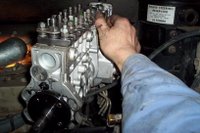 The Cummins Diesel [Engine Model 'C'] fuel injection pump has been repaired, but there are still a few steps to take.
The Cummins Diesel [Engine Model 'C'] fuel injection pump has been repaired, but there are still a few steps to take.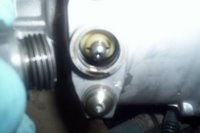
TIMING FUEL INJECTION PUMP:
The fuel injection pump MUST be timed by removing threaded hex cap located on the throttle shaft side of the housing. Remove timing pin from access hole and rotate the pump by hand until the timing tooth inside pump housing lines up with the middle of the access hole.
Engage slotted timing pin as the picture above shows. Install threaded cap hand tight until after injection pump is installed. The injection pump is now in the proper timed position.

PRE-LUBE INJECTION PUMP:
When a repair has been made on these pumps they must be pre-lubed with engine oil. Remove top plug from the governor housing with an Allen wrench. This particular model requires .71 Litres [24 oz.] . Failure to do this could cause damage during start-up.
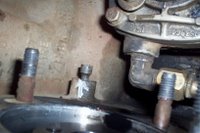
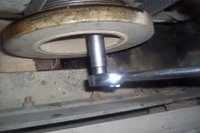
TIMING THE ENGINE:
The next step is to time the engine by rotating clockwise [viewed from the front] while pushing on timing pin until it engages into the camshaft gear. Engine is now properly timed, the fuel injection pump is ready to INSTALL.
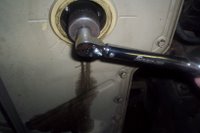 After the 4 mounting bolts are tightened, torque accessory drive gear retaining nut to 106 in. lbs. then DISENGAGE BOTH TIMING PINS. The injection pump timing pin just pulls out, flips around and stays installed on the pump for next time. The engine timing pin just pulls back and stays put.
After the 4 mounting bolts are tightened, torque accessory drive gear retaining nut to 106 in. lbs. then DISENGAGE BOTH TIMING PINS. The injection pump timing pin just pulls out, flips around and stays installed on the pump for next time. The engine timing pin just pulls back and stays put.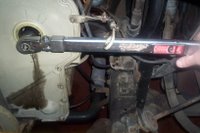
TORQUE DRIVE GEAR RETAINING NUT:
Now it's time for the final torque 144 ft. lbs. NOTE: torque specs will vary depending on the injection pump model. Now it probably makes sense to you why it's important to disengage both timing pins. They will sheer off very easily being made out of plastic and debris will get into the injection pump housing or engine timing gear housing.
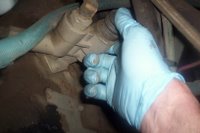

BLEEDING THE FUEL INJECTION SYSTEM:
Once the lines, linkages and accessories have been assembled it's time to bleed the system. Loosen bleeder plug located on the engine side of the injection pump. Operate transfer pump by hand until all air has been bled out of bleeder plug. Tighten bleeder plug.
Crack as many injector lines as you can at each cylinder and crank over engine until there is evidence of fuel at each injector. Stop cranking and tighten injector lines, start cranking engine once again and before you know it you'll have a smokin' diesel engine!
Labels:school bus,repairs,diesel,engine,
cummins diesel motors
,
cummins diesel repair
,
cummins engine repair
,
fleet Mechanic
,
mechanic info
,
mechanic information
,
mechanic tips
,
mechanical repairs
Sunday, January 09, 2011
No Start Cummins Diesel Engine
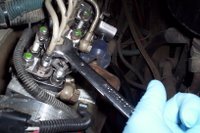 Cummins Diesel Engine
Cummins Diesel EngineHere are a few tips and checks you can make when your Cummins Diesel Engine will not start. This information pertains to mechanical injection diesel engines.
Don't feel insulted with some of these checks because the simplest steps have been overlooked many times.
The rule of thumb is Check The Simple Things First!
- When your Diesel engine cranks but will not start - No smoke from exhaust
- Is there fuel in the supply tank? Always check the source on your diesel engine
- Check electric or manual fuel shut-off.
- Is the air intake or exhaust plugged?
- Note: Remember, a diesel engine needs air and fuel to run
- Fuel filter plugged / seperator full of water?-drain as required.
- Your diesel engine injection pump not getting fuel or fuel is aerated. Check fuel flow or bleed fuel system.
- Check inlet restriction to fuel transfer pump
- Inspect lift pump operation. Remove outlet line and crank over engine
- Worn or malfunctioning injection pump
- Internal pump timing incorrect
- Engine camshaft out of time
Check the filters to see if they are still full of fuel, if not you've got a diesel engine that has run out of fuel - a no brainer. I went on a service call once and found out that the operator had filled the tank with gasoline, anything can happen!
Otherwise you have an obvious failure that you have to sink your teeth into. Replace fuel filters if the mileage or hours are excessive.
Check fuel lines from the tank to the primary filter [Fuel/Water Seperator]
Tip: I use a remote fuel container and slip the suction line before or after the primary filter. If diesel engine performance improves you know you have to start checking for faults back to the tank.
This procedure bypasses the fuel tank and lines up to that point which tells you if the problem exists in those areas i.e. restriction or split/cracked fuel line or bad pick-up tube in the tank.
Pull output line off of the lift pump on the side of the block and crank engine over and check for fuel output.
Prime fuel system with primer pump and bleed the injection pump, once primed crack injection lines at the injection pump and observe for fuel output.
In most cases you will find a problem up to this point, if not check injection pump timing or check to see if the camshaft gear is actually driving the injection pump. These failures are not common at all.
I hope these tips help you troubleshoot your Cummins Diesel Engine.
Labels:school bus,repairs,diesel,engine,
cummins
,
cummins diesel motors
,
cummins diesel repair
,
cummins engine repair
,
cummins isc
,
diesel engine troubleshooting
,
diesel mechanic
,
mechanic information
,
mechanic troubleshooting
Monday, November 22, 2010
Cummins ISB Troubleshooting Coolant In The Lubricating Oil
The Cummins ISB diesel engine is one of my favorites in the fleet, simply because it's easy to work on and really does not cause a lot of problems in the long run. Every Mechanic knows that easy accessibility is key to a smooth repair and these models are great to work on even if the back 2 cylinders are under the firewall on a school bus.
However no diesel is perfect so follow me through this quick troubleshooting procedure if you experience coolant in the lubricating oil.
1. The first thing to check is the lubricating oil cooler. The engine oil is cooled by way of the coolant running through a sealed core inside the housing. If it develops a leak you're stuck with coolant getting in the oil. The coolant core can be tested and replaced.
2. The next possibility is the air compressor cylinder head is cracked, has a defective casting (porous) or the head gasket is defective. This is an overlooked cause, the cooling system from the engine is connected to the compressor running through the compressor cyl. head.
3. If your cummins isb engine came with an aftercooler it can be pressure tested to see if there is any problems with the inner core leaking.
isb engine came with an aftercooler it can be pressure tested to see if there is any problems with the inner core leaking.
4. The engine cylinder head is the next possibility with a leaking core or defective expansion plugs. The head must be checked out with a pressure test and magniflux test to find any leaks or cracks.
5. Last but not least is the worst case scenario, the cylinder block. If it's cracked or porous you may be looking for a replacement block or reman (remanufactured) engine.
These are mechanic tips that you can use to get you started finding the cause of coolant in your engine oil.
CHECK OUT ALL MY PREVIOUS POSTS ON THE CUMMINS ISB ENGINE
However no diesel is perfect so follow me through this quick troubleshooting procedure if you experience coolant in the lubricating oil.
1. The first thing to check is the lubricating oil cooler. The engine oil is cooled by way of the coolant running through a sealed core inside the housing. If it develops a leak you're stuck with coolant getting in the oil. The coolant core can be tested and replaced.
2. The next possibility is the air compressor cylinder head is cracked, has a defective casting (porous) or the head gasket is defective. This is an overlooked cause, the cooling system from the engine is connected to the compressor running through the compressor cyl. head.
3. If your cummins
4. The engine cylinder head is the next possibility with a leaking core or defective expansion plugs. The head must be checked out with a pressure test and magniflux test to find any leaks or cracks.
5. Last but not least is the worst case scenario, the cylinder block. If it's cracked or porous you may be looking for a replacement block or reman (remanufactured) engine.
These are mechanic tips that you can use to get you started finding the cause of coolant in your engine oil.
CHECK OUT ALL MY PREVIOUS POSTS ON THE CUMMINS ISB ENGINE
Labels:school bus,repairs,diesel,engine,
cummins 24 valve turbo diesel
,
cummins diesel repair
,
cummins engine repair
,
cummins ISB Engine
,
diesel engine repairing and troubleshooting
,
diesel engine troubleshooting
,
diesel mechanic information
Friday, June 04, 2010
Cummins ISC Diesel Engine Fuel In Oil Repair.
The Cummins ISC Diesel Engine is a great performer, we have several in our fleet and they are a very durable diesel engine. As with any engine there are failures and in this case we experienced the oil level increasing to an over full condition. One test that told us it was fuel in the oil was the oil sample analysis. We took a sample and the guys at BTA in Kamloops faxed over a report to let us know it was in fact diesel fuel.
Another tell tale red flag was the oil pressure was dropping below normal along with a splatter of oil on the rear engine compartment door. The viscosity decreased making the oil thinner causing these conditions. We actually went through this repair before and the symptoms were exactly the same (that's what happens when you have a fleet with the same drive train).

The CAPS Fuel Pump has to be replaced to repair this condition since it provides the high pressure fuel and injection delivery. It runs directly off the accessory gear and is about the same size as a 2 cylinder air compressor. The fuel lines and accessories have to be removed along with the pump accessory drive gear. The first thing to do after this repair is change the engine oil and get rid of that thinned out engine oil.
Labels:school bus,repairs,diesel,engine,
CAPS pump
,
cummins
,
cummins diesel motors
,
cummins diesel repair
,
cummins engine repair
,
cummins isc
,
diesel engine
,
diesel engine repairing and troubleshooting
,
diesel engine troubleshooting
Monday, April 06, 2009
Cummins Diesel Repair - ISC Model
 This particular Cummins diesel repair was necessary because of an indirect code that was finally traced to the camshaft endplay. There are 2 sensors installed to the backside of the timing cover just below the top drive gear (the 2 black round shaped sensors are visible to the right of the cam shaft bearing bore). One is the camshaft position sensor the other is the engine speed sensor.
This particular Cummins diesel repair was necessary because of an indirect code that was finally traced to the camshaft endplay. There are 2 sensors installed to the backside of the timing cover just below the top drive gear (the 2 black round shaped sensors are visible to the right of the cam shaft bearing bore). One is the camshaft position sensor the other is the engine speed sensor.
 To remove the camshaft the rocker arms and shafts must be removed first. The wooden dowels act as holding devices that jam into the solid lifters that ride on top of the cam lobes. Once the dowels are installed elastic bands are used to hold them secure while removing the camshaft. This saves a lot of time not having to pull the cylinder head.
To remove the camshaft the rocker arms and shafts must be removed first. The wooden dowels act as holding devices that jam into the solid lifters that ride on top of the cam lobes. Once the dowels are installed elastic bands are used to hold them secure while removing the camshaft. This saves a lot of time not having to pull the cylinder head. The camshaft endplay was excessive which caused the sensor problem/codes to become a regular occurrence. The first step we took was to change the sensors, this cured the problem for several weeks but the fault always came back to haunt us. The camshaft showed signs of wear on the shoulder where the gear sits and the cam lobes as well. There is a thrust washer that goes between the gear and the engine block to help with endplay movement.
The camshaft endplay was excessive which caused the sensor problem/codes to become a regular occurrence. The first step we took was to change the sensors, this cured the problem for several weeks but the fault always came back to haunt us. The camshaft showed signs of wear on the shoulder where the gear sits and the cam lobes as well. There is a thrust washer that goes between the gear and the engine block to help with endplay movement. If you have to do this job in a Thomas ER Pusher Bus you will have to remove the rear engine mounts and lower the engine enough to get the rear pushrods out of the engine. The solid floorboards above are not designed to allow the pushrods enough headroom for removal.
If you have to do this job in a Thomas ER Pusher Bus you will have to remove the rear engine mounts and lower the engine enough to get the rear pushrods out of the engine. The solid floorboards above are not designed to allow the pushrods enough headroom for removal.The cam gear has to be heated to 400 degrees Fahrenheit to install back onto the camshaft. We elected to replace the gear as well as the camshaft. If you are a Diesel Mechanic this is a Cummins Engine repair you may have to go through one day. I hope this mechanic info has helped you understand the procedures involved in this operation.
Labels:school bus,repairs,diesel,engine,
cummins diesel motors
,
cummins diesel repair
,
cummins engine repair
,
diesel mechanic
,
diesel mechanic information
,
mechanic info
,
thomas buses
,
thomas school bus
,
used cummins engines
Subscribe to:
Posts
(
Atom
)
